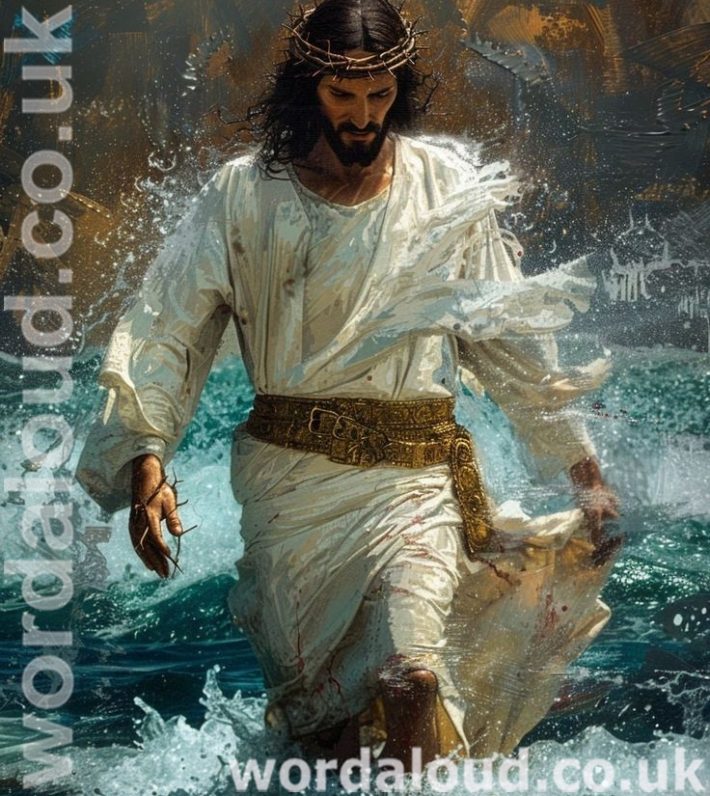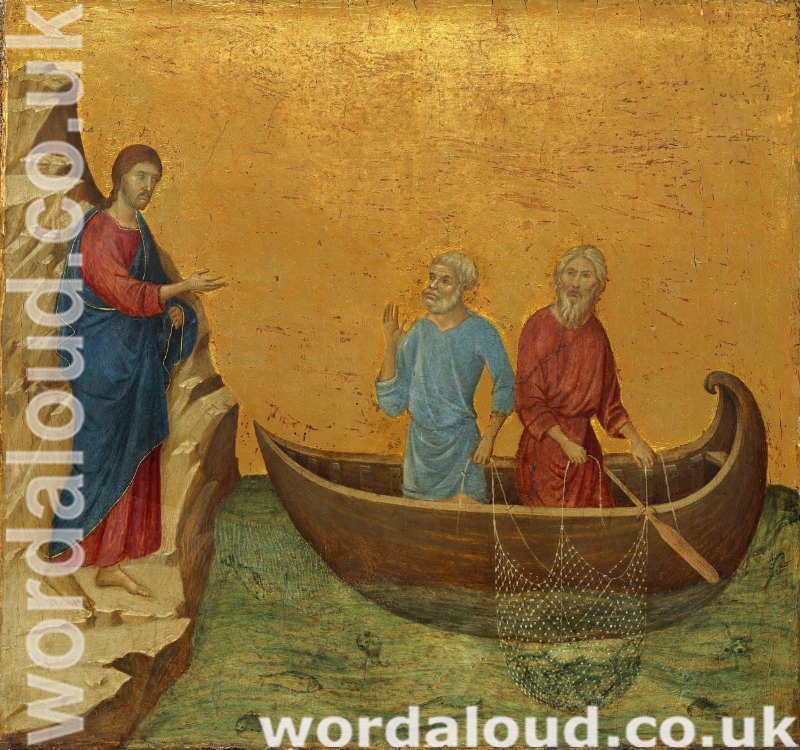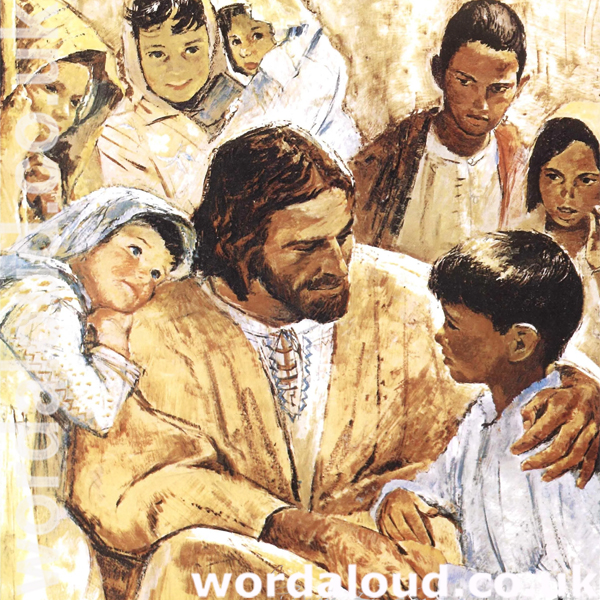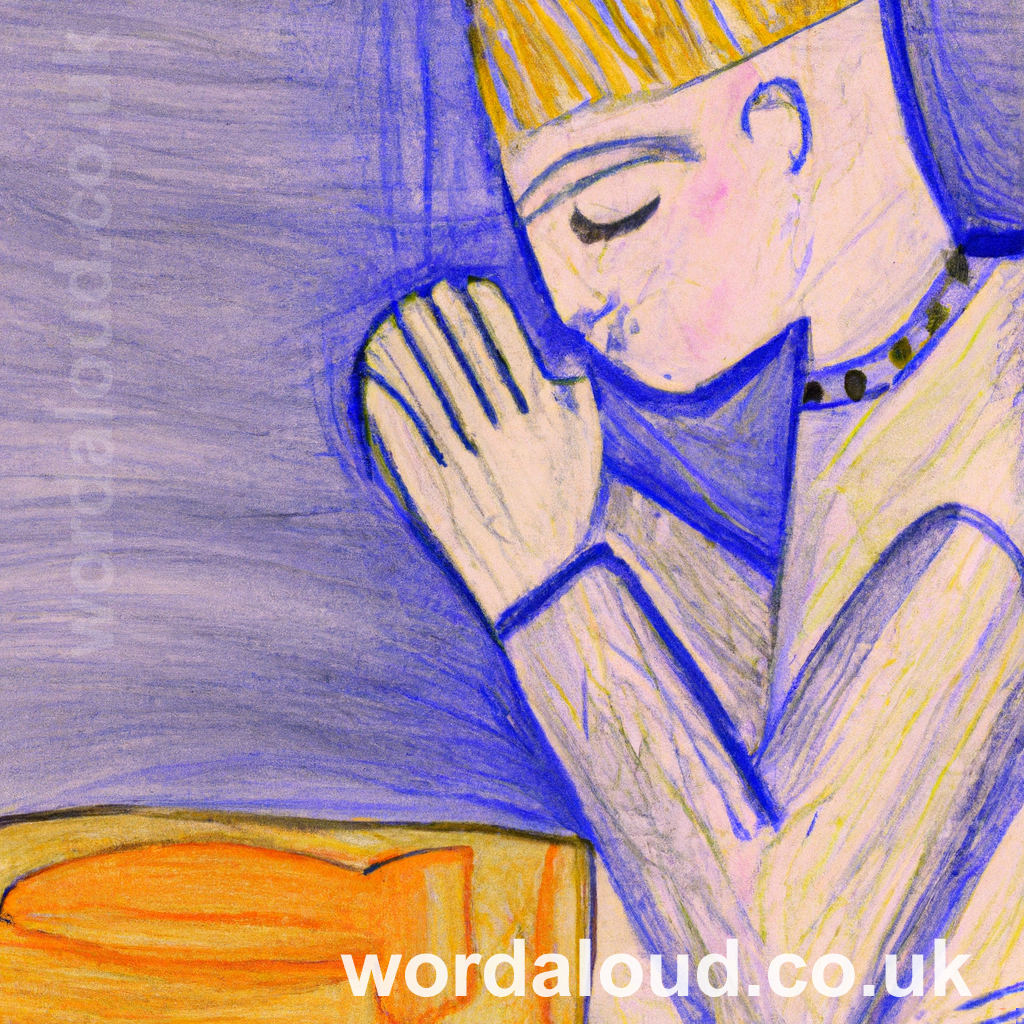Christian Art | Jesus Walks Through Water | Our Baptism Of Christian Faith
Office Of Readings | Week 29, Saturday, Ordinary Time | A Reading From The Sermons Of Saint Peter Chrysologus | The Word, The Wisdom Of God, Was Made Flesh
‘The Word, the Wisdom of God, was made flesh.’
Saint Peter Chrysologus contrasts the two Adams to show the transformation of human nature through Christ. The first man, Adam, is the origin of the human race in its mortality; the second, Christ, is the origin of its renewal and life. Both share the same humanity, but they differ absolutely in their source and purpose. Adam received life; Christ gives it. Adam was shaped from the earth; Christ took flesh from the Virgin, raising human nature into union with God.
The structure of Chrysologus’s argument reflects the logic of early Christian theology: creation and redemption are bound together. The one who made Adam is the same who later became man to restore what had fallen. The ‘image’ stamped on the first Adam finds its completion in the second. What was made in the beginning is re-made in the Incarnation. Thus, when Christ calls himself ‘the first and the last’, he affirms both his eternal divinity and his redemptive action within time.
Chrysologus also draws on Saint Paul’s contrast between the earthly and heavenly man. The first is bound to the dust; the second belongs to heaven. Yet those who are born of the earth may still come to share in the heavenly life, not by natural descent but by spiritual rebirth. Through baptism — ‘the virginal font’ animated by the Spirit — human beings are recreated in the likeness of their Maker. The same Spirit who formed Christ in the Virgin’s womb now forms Christ’s image within the baptised.
The homily turns doctrine into exhortation. To be made in the image of the heavenly man is not only a state but a calling. The likeness of God is to be expressed in conduct: innocence, gentleness, humility, mercy, and peace. These are the visible signs of divine likeness within human life. In this moral transformation, the mystery of the Incarnation continues — the Word made flesh now refashioning human flesh into the image of God.
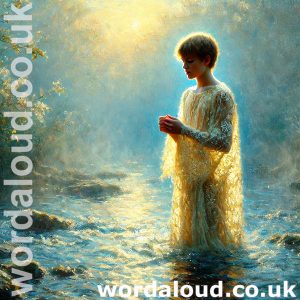
A Reading From The Sermons Of Saint Peter Chrysologus | The Word, The Wisdom Of God, Was Made Flesh
The holy Apostle has told us that the human race takes its origin from two men, Adam and Christ; two men equal in body but unequal in merit, wholly alike in their physical structure but totally unlike in the very origin of their being. The first man, Adam, he says, became a living soul, the last Adam a life-giving Spirit.
The first Adam was made by the last Adam, from whom he also received his soul, to give him life. The last Adam was formed by his own action; he did not have to wait for life to be given him by someone else, but was the only one who could give life to all. The first Adam was formed from valueless clay, the second Adam came forth from the precious womb of the Virgin. In the case of the first Adam, earth was changed into flesh; in the case of the second Adam, flesh was raised up to be God.
What more need be said? The second Adam stamped his image on the first Adam when he created him. That is why he took on himself the role, and the name, of the first Adam, in order that he might not lose what he had made in his own image. The first Adam, the last Adam; the first had a beginning, the last knows no end. The last Adam is indeed the first; as he himself says: I am the first and the last.
I am the first, that is, I have no beginning. I am the last, that is, I have no end. But what was spiritual, says the Apostle, did not come first, what was living came first, then what is spiritual. The earth comes before its fruit, but the earth is not so valuable as its fruit. The earth exacts pain and toil; its fruit bestows subsistence and life. The prophet rightly boasted of this fruit: Our earth has yielded its fruit. What is this fruit? The fruit referred to in another place: I will place upon your throne one who is the fruit of your body. The first man, says the Apostle, was made from the earth and belongs to the earth; the second man is from heaven, and belongs to heaven.
The man made from the earth is the pattern of those who belong to the earth; the man from heaven is the pattern of those who belong to heaven. How is it that these last, though they do not belong to heaven by birth, will yet belong to heaven, men who do not remain what they were by birth but persevere in being what they have become by rebirth? The reason is, brethren, that the heavenly Spirit, by the mysterious infusion of his light, gives fertility to the womb of the virginal font. The Spirit brings forth as men belonging to heaven those whose earthly ancestry brought them forth as men belonging to the earth, and in a condition of wretchedness; he gives them the likeness of their Creator. Now that we are reborn, refashioned in the image of our Creator, we must fulfil what the Apostle commands: So, as we have worn the likeness of the man of earth, let us also wear the likeness of the man of heaven.
Now that we are reborn, as I have said, in the likeness of our Lord, and have indeed been adopted by God as his children, let us put on the complete image of our Creator so as to be wholly like him, not in the glory that he alone possesses, but in innocence, simplicity, gentleness, patience, humility, mercy, harmony, those qualities in which he chose to become, and to be, one with us.
Christian Prayer With Jesus
Eternal Word,
you shaped the first man from the earth
and took flesh to restore your image in us.
Through the Spirit who gives new birth,
make us bear the likeness of the heavenly man.
Grant that our lives may reflect your gentleness and mercy,
your patience and humility,
until the glory of your image is complete in us
and we share the life you have made our own.
Amen.
A Brief Biography Of Saint Peter Chrysologus
Saint Peter Chrysologus was bishop of Ravenna in the fifth century and is honoured as one of the great Latin Fathers of the Church. His surname Chrysologus, meaning ‘golden-worded’, was given in recognition of his gift for eloquence and his ability to convey complex theological ideas with clarity and brevity. Though comparatively little is known about his life, his surviving sermons reveal a pastor of deep learning, precision of thought, and practical concern for his people.
Peter was born at Imola in northern Italy around the year 380. He was ordained deacon by Cornelius, bishop of Imola, who recognised his promise as a preacher and teacher. In about 433 he was appointed bishop of Ravenna, then the imperial capital of the Western Roman Empire. According to later tradition, his appointment followed a vision experienced by Pope Sixtus III, who saw Peter chosen by divine will for the see.
As bishop, Peter served at a time of doctrinal dispute and political uncertainty. The unity of the Western Church was strained by heresies such as Monophysitism and by the decline of imperial authority in Italy. Peter’s response was not polemical but pastoral. His surviving homilies — around 180 in number — address moral and doctrinal themes with striking economy of expression. He insists on the full humanity and divinity of Christ, the reality of the Incarnation, and the necessity of moral transformation through baptism and charity.
Peter’s preaching style reflects the classical rhetorical training of late antiquity, but his purpose is always practical: to lead his listeners to repentance and renewed life in Christ. He frequently employs vivid imagery drawn from Scripture — the womb, the seed, the mirror, the refashioned clay — to communicate how divine grace restores what sin has disfigured. His sermons on the Incarnation and the two Adams exemplify his theology: creation and redemption are two moments of the same divine act, the restoration of the image of God in humanity.
Saint Peter Chrysologus died around 450, probably in Imola, the city of his birth. He was declared a Doctor of the Church by Pope Benedict XIII in 1729. His feast is celebrated on 30 July, and he remains a model of concise preaching and theological clarity — a bishop whose ‘golden words’ continue to speak with pastoral insight and enduring relevance.
Glossary Of Christian Terms
Adam / Christ (Two Adams) – A theological comparison from 1 Corinthians 15:45; Adam represents humanity’s natural origin and mortality, Christ its renewal and immortality.
Living soul / life-giving Spirit – Paul’s contrast between Adam, who received life, and Christ, who imparts it.
Virginal font – A metaphor for baptism, comparing the baptismal waters to the Virgin’s womb, both made fruitful by the Holy Spirit.
Man of earth / man of heaven – The earthly and heavenly forms of humanity; the former marked by sin and death, the latter by divine likeness through grace.
Image of the Creator – Humanity’s original state as created in God’s image, restored through Christ’s Incarnation and the work of the Spirit.

